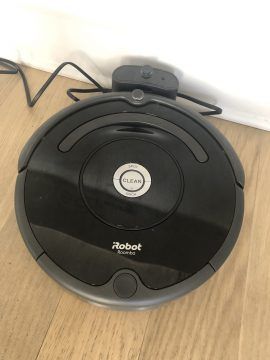by Sarah Firisen

When I moved into a new, larger apartment with my boyfriend a couple of months ago, I decided to buy a Roomba, robot vacuum cleaner. I named her Joanne. I love Joanne, my boyfriend is less of a fan. He finds her hour and a half or so a day moving around the apartment to be intrusive. He doesn’t appreciate me going around beforehand and picking his things off the floor so that she doesn’t get caught in them. When I was at work one day and she got stuck, it was a toss up whether he was going to rescue her or not – he did, but grudgingly. He says to me, “Why does she have to vacuum every day? You don’t vacuum every day”. My response, “Let’s set the bar a little higher than my housekeeping”. And it’s true, Joanne does takes a long time to do what I can do pretty quickly. And she can’t, and doesn’t get to every spot. On the other hand, she can get to spots under cabinets, or beds, that I can’t, or at least don’t get to. Does she clean as well in one session as a professional cleaner would? No. Does she clean better over the course of a week than I do, definitely.
She runs every day, and because she’s not smart, sometimes she gets a bit stuck in a room and does a better job of that room than the rest of the apartment, but over a week it evens out. And, here’s the thing, I don’t have to vacuum, and as I point out to my boyfriend, neither does he. It’s one less thing for us to do and to bicker over and our apartment is always at a baseline level of dust free clean and, because I do have to pick up before she runs, the apartment is just generally tidier and more clutter free. Once or twice a week, I follow Joanne around and clean the rest of the apartment, doing the bathrooms and once she’s finished vacuuming, washing the floors. But somehow, even this work seems less onerous because what I don’t have to do is vacuum. Not doing that lightens my load significantly, both in reality and mentally. Joanne has made housework easier for us and I love her. The joke among my friends (and Joanne and her travails have quite a following on Facebook), is that my boyfriend shouldn’t make me choose between him and Joanne. I have no comment to make on that.
As automation creeps into more and more back and front office work, there’s a lot of understandable fear about loss of jobs. But in reality, a lot of automation will be more like Joanne than anything else, taking out a lot of the drudgery that most of us inevitably have in our daily work. There’s been a fair bit of press recently about companies experimenting with shorter work weeks. In some cases, it’s compressing a regular work week into 4 days, but in some cases, it’s actually making the work week shorter (while paying employees the same as for 5 days). Mostly, the results have been interesting: employees are more productive, “An experiment that involved reducing the workweek by one day led to a 40% boost in productivity in a Microsoft subsidiary in Japan,”. But even with a bunch of examples of the bottom line benefits to companies (they also have to pay less for electricity, etc), to say nothing of the employee morale boost and therefore almost inevitable retention benefits, this is still a concept that remains on the fringes, “Today, employers are often unwilling to experiment with the four-day workweek, a reluctance that Mr. Grant attributes to a lack of three things: interest, faith in employees and understanding of the benefits that a shortened week can offer.” As an increasing number of white collar office workers find themselves with their digital version of Joanne the Roomba, an automation bot on their desktops, working alongside of them, it’s much easier to envision how we could all be working less hours, but getting more done.
After all, it’s not just that so much of the manual, repetitive work that we have to do in the course of our daily jobs is time consuming, it’s boring, it’s draining. We don’t enjoy it, we procrastinate about doing it (I do at least). We’re not in flow, working at peak performance while we’re doing this kind of work. But what if we didn’t have to do those tasks? What if, like my vacuuming, they were taken care of for us? Even if, like my Roomba, our office bot sometimes needed a helping hand from a human when a decision needed to be made or there was an exception, how much happier and more productive might we all be? Somehow, by taking away the most mundane and hated of housekeeping tasks (for me), vacuuming, Joanne has enabled me to be an overall better housekeeper; I do the other tasks more willingly and therefore more frequently. And I have more free time to do things that I do value. What might a work day like that feel like? And if I could do the higher value, more interesting, creative, strategic and meaningful tasks in only 4 days once the mundane activities are removed, even better. We should all be rooting for this to be the future of work.
